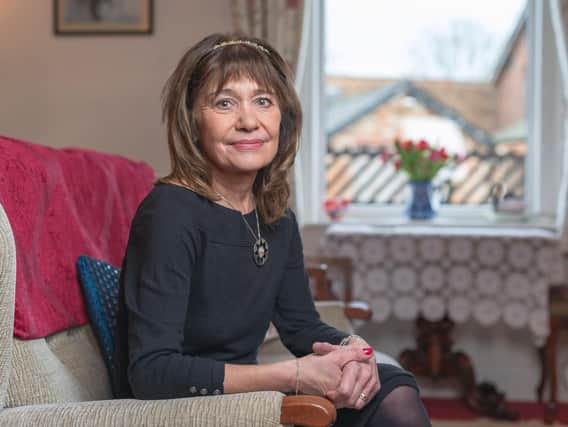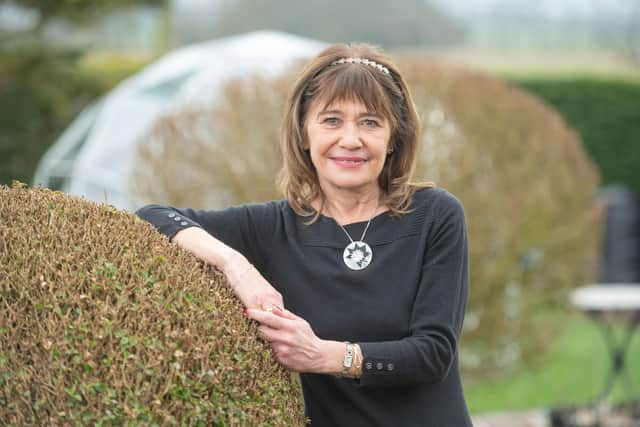'I owe my life to cancer research' says Yorkshire survivor whose husband died after bowel cancer diagnosis


The 60-year-old from North Yorkshire is in remission from anal and lung cancer, but whilst she was undergoing treatment, her husband Ray was also diagnosed.
She lost him in 2021 at the age of 67 following his bowel cancer diagnosis, and months later, her mother Marjorie Ainsbury, who had mouth and throat cancer, died aged 99.
Advertisement
Hide AdAdvertisement
Hide AdNow Alison, who lives in Gristhorpe near Filey, is sharing her story to urge people to support cancer research ahead of World Cancer Day on February 4.
Alison was in shock when she learned she had cancer in August 2019. “When I got that first diagnosis it was over the phone, on a Friday afternoon and I was at work in a busy office. I went to see my boss in tears and went home.”
After successful treatment, a routine scan in 2020 showed she had developed secondary lung cancer. Following further treatment and now in remission, Alison hopes that sharing her story will inspire others to mark awareness day by joining the fight against cancer.
Backing a Cancer Research UK campaign to help give hope to future generations, Alison, a former support worker for people caring for someone at home, says: “If I had been diagnosed with cancer ten or 20 years ago, the outcome might not have been the same for me and that’s down to research.”
Advertisement
Hide AdAdvertisement
Hide AdAlison became aware something was wrong after experiencing bleeding from her back passage. She initially put off seeking medical advice but with worsening symptoms, she went to her GP surgery where she was told she had a growth and was referred to York Hospital the same day.


The initial diagnosis was confirmed at St James’s University Hospital in Leeds and Alison was treated with 28 sessions of radiotherapy and chemotherapy. Whilst she was going through her ordeal, she began to be concerned about Ray, noticing that as soon as he dropped her at the hospital, he needed to dash off to a loo.
He suggested to Alison that they tried different diets but that didn’t help. “He was buying all sorts of things online, solutions and vitamins and stuff like this. I thought there’s something wrong here...
“He was getting worse, I could see he was losing weight. Towards the end of 2020, it had got really bad. He didn’t go out. He was miserable and he was grumpy.”
Advertisement
Hide AdAdvertisement
Hide AdRay eventually saw a doctor and was referred to hospital. During this time and after 25 years together, Ray proposed to Alison and they were married in December 2020.
Alison says: “He got himself a new suit from Next and he looked really smart. It was an ordeal for him but we got through it. In January 2021 he was diagnosed with bowel cancer.”
Ray had a stoma bag fitted to relieve the pressure on the tumour so he could have treatment. Meanwhile, Alison received another blow, when a regular scan showed she had secondary lung cancer and she began more radiotherapy at Leeds.
Despite everything the couple was going through, Alison refused to take it personally. “It was Ray who voiced that. Why us? I said it’s random Ray, it doesn’t know your name and it doesn’t care.”
Advertisement
Hide AdAdvertisement
Hide AdAlthough Ray had chemotherapy and radiotherapy, he died at home, having recently retired from his work as an agricultural engineer.
“Before he was poorly he was a joker,” Alison says. “He was very honourable and very kind. He loved wildlife, he was a big fundraiser for WWF and he loved living here. He was a deep thinker, he read widely and he was keen to learn.”
Alison faced a further bereavement when her much-loved mum, Marjorie, died at home in Scarborough in 2022.
Alison is now a regular giver to Cancer Research UK and said her motivation is to stop anyone from going through what she’s been through. She wants to encourage people to seek medical advice if they have symptoms, so they can benefit from treatment.
Advertisement
Hide AdAdvertisement
Hide Ad“I think Ray had probably had cancer for a year or more before he went to the doctor. If your body starts doing things you don’t expect, you really need to consider doing something about it. The worst thing you can do is do nothing,” she says.
With around 32,500 people diagnosed with cancer every year in Yorkshire and the Humber, Alison is calling on people to give regularly to help fund long term research projects that could drive new breakthroughs for people like her. Life-saving cancer treatments are made possible by months and months of trialling, testing and learning.
Alison says: “I’m sure we would all love to see cancer gone but this won’t be possible without the dedication of scientists who are relentlessly striving towards new milestones month after month. They need our support.
“We know that one in two people will get it, so we need people to have the skills, the technology and the equipment to try to stop it. I want to be able to contribute to the cause. All this research and training and equipment costs money. Without the money the whole thing would stop.”
Advertisement
Hide AdAdvertisement
Hide AdCancer Research UK has been at the heart of the progress that has seen survival in the UK double in the last 40 years, with its research contributing to cancer drugs now being used to treat patients across the UK and around the world.
World Cancer Day Unity Bands are available from one of the charity’s shops while stocks last, as a way of showing solidarity with people affected by cancer.
Cancer Research UK spokesperson for North Yorkshire, Michaela Robinson-Tate said: “This World Cancer Day, we want to say a heartfelt thank you to our customers, donors and supporters like Alison. Thanks to their generosity and commitment to the cause, we’ve been at the forefront of cancer research for over 120 years and we’re not stopping now.
“Regular giving is crucial to our work, because it means we can fund long term research – research that could lead to new discoveries about cancer and unlock new ways to prevent, diagnose and treat it. One in two of us will get cancer in our lifetime, but all of us can help beat it.”
